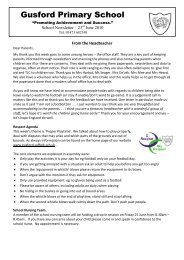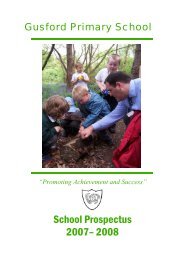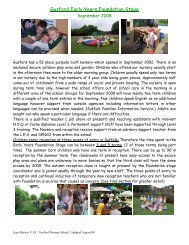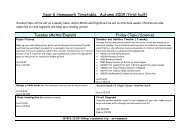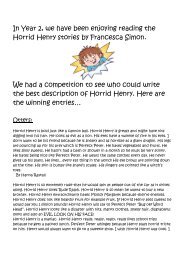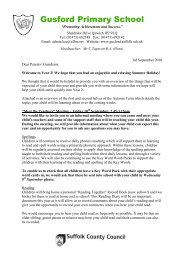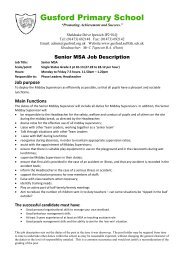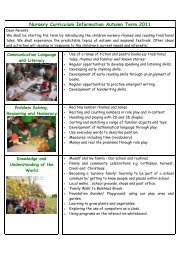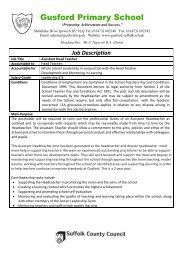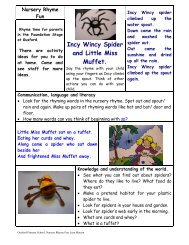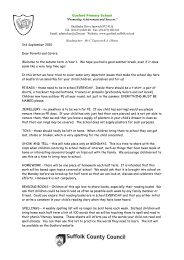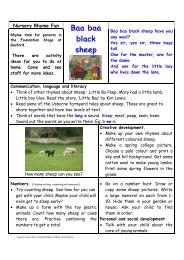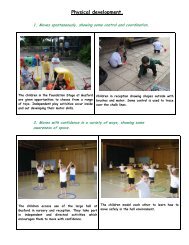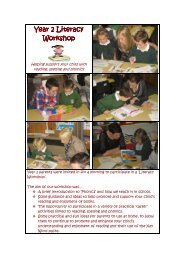Sats Revision Guide - Gusford Primary School
Sats Revision Guide - Gusford Primary School
Sats Revision Guide - Gusford Primary School
- No tags were found...
You also want an ePaper? Increase the reach of your titles
YUMPU automatically turns print PDFs into web optimized ePapers that Google loves.
<strong>Gusford</strong> <strong>Primary</strong> <strong>School</strong>“Promoting Achievement and Success.”Sheldrake Drive Ipswich IP2 9LQTel: (01473) 682148 Fax: (01473) 692142Email: admin@gusford.org.uk Website: www.gusford.suffolk.sch.uk22 March 2011Dear Parent/CarerHeadteacher: Mr C Tapscott B.A. (Hons)I am writing to inform you of the arrangements for the forthcoming Year 6 SATs tests,to be held in the week beginning May 9 th 2011. These are the National Tests for 11year olds, which enable schools to monitor pupil progress and, in the case ofsecondary schools, group the children.Attached is a timetable for the week. It is vital that your child is in school for the testsas they are not permitted to sit them at a later date if absent. Please avoid makingdental appointments etc during that week. If your child is ill please contact the schoolon the morning of the test to inform us. However, please ensure your child attends ifat all possible, even if it means them attending just for the test and then returninghome.All of the necessary equipment will be provided by the school. However, your childmay wish to purchase their own pen (no biros please) as it is important that theyhave a good pen, which they are comfortable writing with, particularly for theextended writing task.The children will not receive a formal homework timetable for the first half of theSummer Term as it is expected that their time will be used for personal revision – attimes the class teacher may issue some revision linked to lessons taught that week.Also attached are some useful revision tips and resources which may help your childwhen revising.Finally, we hope to prepare the children as well as we can whilst not creating anunnecessarily stressful atmosphere. We do remind the children that not everythingrests on the tests as the teachers will assess them as well, based on theirperformance over the year. We, like you as parents, just want them to do their best.Please contact us if we can be of any help at all.Yours faithfullyMs.Headlam Mr.Gray Mrs.Clayton
Whilst it is the school’s responsibility to prepare your child for the tests,listed below are some practical ways in which you can support your childbefore and during the tests: Make sure your child isn’t going to school feeling tired; thisreduces concentration and makes it difficult to learn new concepts. Make sure your child has plenty of exercise and leisure time – Year6 is an intense year group and a balance between work andrelaxation is needed for children to do their best. Support your child with homework and revision activities.The BBC websites www.bbc.c.o.uk/bitesize KS2 andwww.bbc.co.uk/skillswise are recommended. In addition, revisionmaterials are available from the school office for English andMaths. The children will also be given guidance on how to revise.In the recent Spring Term assessments the children were given apersonal summary of areas for development for each subject (acopy of which they should have brought home) – these can serve asa focus for revision.Outlined on the following pages are some useful tipsfor revising both literacy and numeracy:
What is required of the children?READINGThe reading test consists of 15 minutes to read abooklet, followed by 45 minutes to answer a seriesof questions about the text.How can I help my child?It is difficult to actually ‘revise’ for the reading test but some of the things youcan do with your child are:Read an extract from a fiction book and discuss the plot and characters. Askthem to give their opinion and back it up from the text, either by referring to aparticular event or by quoting an extract.Browse through a non-fiction book. Can your child identify and explain thepurpose of the following:Sub-headings?Captions?Hyperlinks to websites?A glossary?Does your child know the meaning of the following:A phrase?A simile?A metaphor?Personification (the technique of making inanimate objects seem alive e.gthe wind howled)?The CGP <strong>Revision</strong> Book has some useful ideas on this from p.56 onwards.Please also refer to the booklet of reading ideas and activities whichwe sent home some weeks ago.
WRITINGThe writing test comes in several forms:The long writing task, which includes up to 10 minutes planning and is45 minutes in totalThe short writing task, which includes up to 5 minutes planning and is20 minutes in totalThe spelling testHow can I help my child with writing?Please refer to your child’s personal writing targets forspecific areas which they need to focus on.Planning writingQuick and effective planning can really help to raise the standard of your child’splanning. In this pack you will find the planning formats which we use andpractise at school.Some titles you could practise with are:THE LONG WRITING TASK (10 minutes planning time)Narrative (story)‘The Moving Statue’ – One day you are playing in the park when you notice astone statue in the middle of the pond. When you look more closely you notice itis moving … Write a story about when the statue comes to life.on-narrative‘The <strong>School</strong> Trip’ –The headteacher wants to give the children a newsletter totake home. The newsletter will explain all about the trip and how to prepare forit. Write the newsletter for next year’s Year 6 children to take home. Youcan write the newsletter using information from a real school trip or you canmake up the information.THE SHORT WRITING TASK ( 5 minutes planning)This can often be a descriptive piece, or an informative piece, where the focusis on the quality of writing and effective word choices. Some examples are:Imagine a creature called the Tonga Lizard. It is an endangered animal and maybecome extinct. An information booklet about the lizard is being produced. Yourtask is to produce the page about the Tonga Lizard.
Think about your favourite meal. Your task is to write a description of yourfavourite meal for someone who has never tasted it.Did they use sub-headings? Was the plan in note form?The writing itselfThe writing is marked on 3 aspects:Sentence structure (grammar) and punctuationPurpose (has the pupil written in the appropriate style for the correctaudience?) and organisation (is it paragraphed? introduction? conclusion?etc)Overall effectiveness – is it interesting? good word choices/vocabulary/humour included where relevant?Included in the pack is a more detailed breakdown of the above, specifiyingwhat is required for both Levels 4 and 5.One of the most important ingredients for success is understanding the purposeof the writing and adapting the style accordingly. We will revise this at school,however, if you wish to do some work on this at home, the CGP English StudyBook includes some useful information on this from p.40 onwards
What is required of the children?The numeracy test consists of:Paper A – 45 minutes (calculator not allowed)Paper B – 45 minutes (calculator allowed)Mental Mathematics test (20% of the marks)How can I help my child?Unlike literacy, where there isn’t necessarily a group of facts to learn, numeracyis a subject in which some focused revision can really make a difference. Again,please refer to your child’s personal targets as these identify the specific areaswhere more revision is required. The websites referenced at the beginning andthe CGP Study <strong>Guide</strong>s are recommended for revision of specific aspects ofnumeracy. Below is some general guidance for pupils for the maths tests:Multiplication factsAs you know these underpin many mathematical concepts. Ensuring that yourchild can recall these instantly will really boost their confidence. A next step isto see if they can apply these to more challenging examples e.g:If 4 x 6 = 24 then 4 x 60 = 240 or 0.4 x 6 = 2.4General guidance for the pupils would be:Read the question twice and underline key informationWhen you have found the answer - read the question back:a) have you answered it?b) is your answer reasonable?If you need to change digits, cross ALL of them out and rewriteclearly above. If the marker is unsure it will be marked wrong.Explaining ideas - remember to include clear mathematicalvocabulary, the data to support the idea - also connectivese.g therefore ..If you finish early go over the paper and IMPROVE- find some more marks.
Guidance on calculationsPaper A will test written methods - remember to write the digits in neatcolumns using the space on the paper (please refer to the school’s ‘CalculationPolicy’ for the methods which they should know – available on the website).Check which units the answer needs to be in e.g answer inmetres.Trial and improvement - start with an educated guess, writedown your attempts and use the answers from theseto 'home in' on the right answer.Paper B - calculator - remember to check you have entereddigits correctly. Remember if it is money the calculatorwill show £3.4 but you need to write £3.40Decimals - remember to compare place value of eachdigit e.g 0.5 is bigger than 0.465 (don't be caught out by thenumber of digits after the decimal point).Guidance on shape, space and measuresRemember to use a ruler and a sharp pencil for mathematical diagrams.When interpreting graphs and diagrams, use a rulerto draw lines ON the graph/diagram to improve accuracy.Pie charts - remember to check what overall numberthe whole pie stands for.Scales/measures - write in missing values ON the scaleto check you have understood the value of each intervalcorrectly. Remember - sometimes the scale is in one unit e.g.grammes but the answer has to be converted e.g to kg.Shapes - use tracing paper or a mirror if it helps.Time – it is very important that you are clear about whether you are being askedfor a specific time (What time does …?) or the how long something lasts for (theduration).If it is a specific time it should be written either as a 12 hour clock time e.g2.30pm or 24 hour clock time 14:30If it is a duration it should be written in hours and minutes e.g it lasted 2 hrsand 30 minutes



